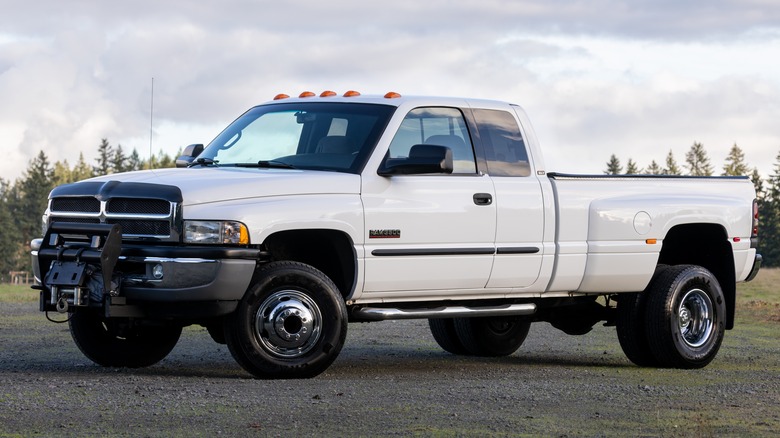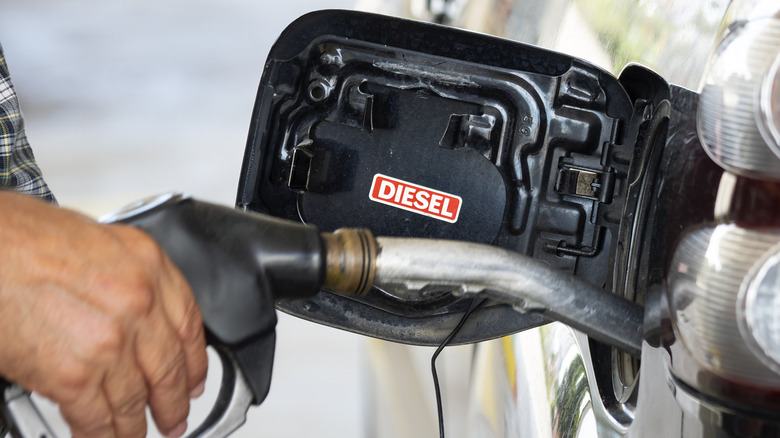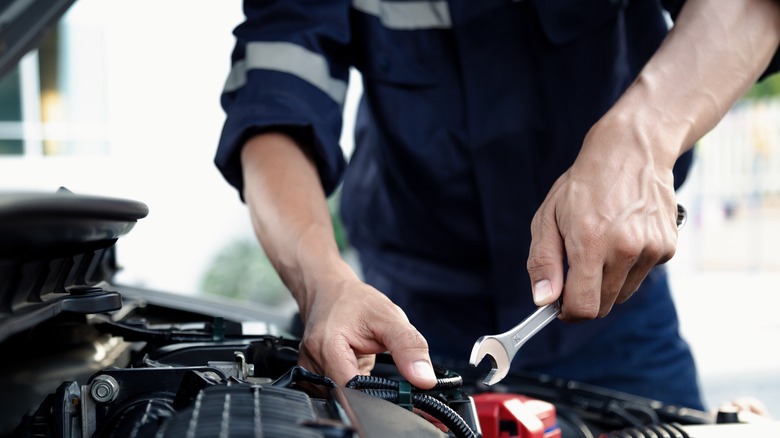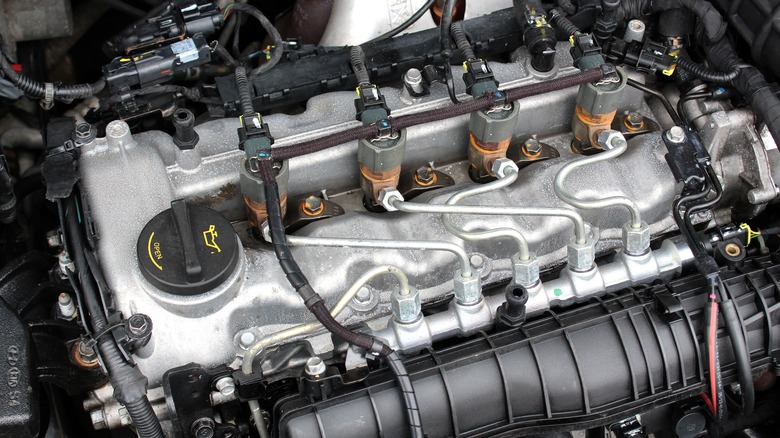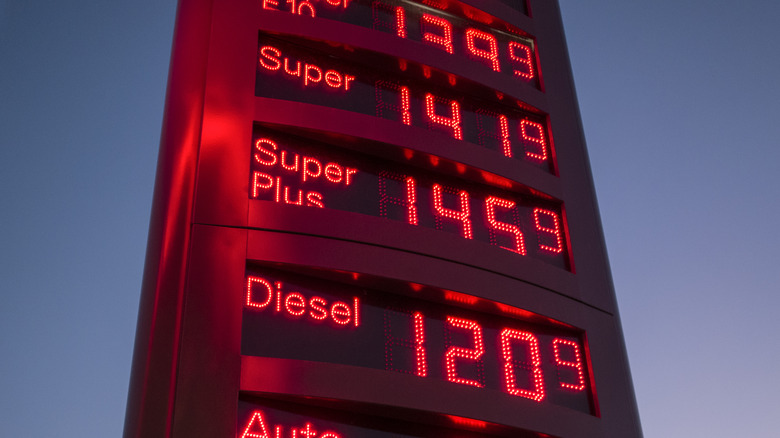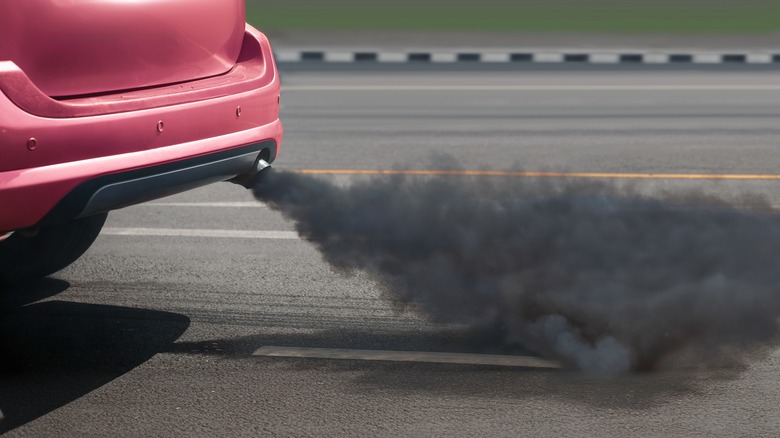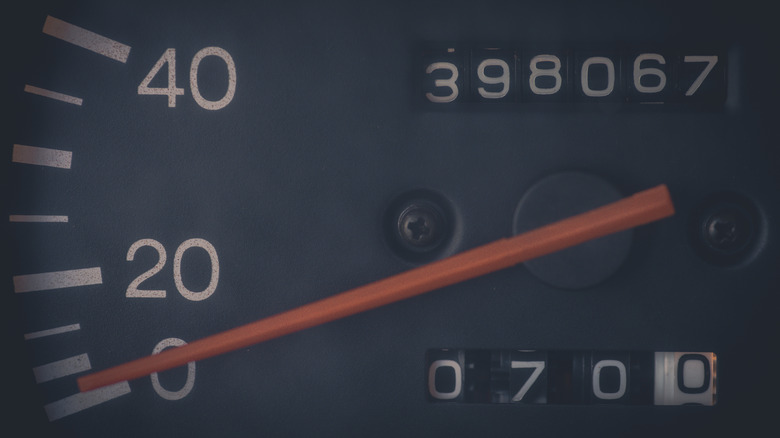10 Things You Should Know Before Buying A Diesel-Powered Car Or Truck
Diesel-powered vehicles have carved out a space among drivers as a go-to option for durability, fuel efficiency, and raw performance. They have a longstanding reputation for being able to handle whatever kind of heavy-duty task is thrown at them while conquering long-distance travel, making them appealing to a wide range of motorists. In fact, a study from the Engine Technology Forum found about 4.5% of U.S. passenger vehicles sold in the third quarter of 2024 were diesel.
The fuel economy really tends to be the clincher for many drivers looking to switch, as it can potentially offer about 30% to 35% better mileage than gasoline counterparts, depending on the type of vehicle. Additionally, the considerable torque diesel engines offer makes them perfect for towing or navigating rugged terrain. Like anything, though, there are some potential downsides — higher upfront costs, unique maintenance, negative environmental impact, and more. In addition, advancements in recent years to hybrid and electric technology have made the competition stiffer with diesel on top of traditional gasoline.
In this guide, we'll break down the 10 most vital considerations to make before pulling the trigger on a diesel-powered vehicle. From maintenance tips to understanding fuel efficiency and emissions systems, we're covering all the bases so you can make an informed choice and see if diesel is the perfect match for your driving style and budget.
Fuel efficiency
Fuel is a double-edged sword when it comes to a diesel vehicle, and drivers should take the time to compare whether or not the better mileage will outweigh the added costs for diesel fuel. Yes, the improved mileage translates to fewer fuel stops, which is especially beneficial for those in rural areas with limited fueling stations. This also makes them an attractive choice for drivers who spend considerable time on the road or who regularly commute longer distances, whether for work or otherwise.
Still, fuel prices for diesel can fluctuate just as easily as gasoline and are generally slightly higher. In most cases, it's still a good trade-off if your lifestyle matches long periods on the road, as the higher fuel economy will offset the costs over time. For example, if you're averaging about 30 miles per gallon with your diesel vehicle compared to 20 miles with a gasoline-powered, the savings will quickly add up.
Something that you might not know about diesel vehicles, however, is that they require Diesel Exhaust Fluid (DEF) for emissions compliance, a top necessity for newer models as well. DEF consumption will depend on the exact diesel vehicle and the driving conditions you're in, but it typically adds a modest cost to consider for consistent upkeep. Even so, if your lifestyle matches consistent long commutes on the highway, you're still on the right track with considering diesel power as a viable and efficient option for your next vehicle.
Maintenance requirements
Diesel engines are known for their longevity and reliability, but they do come with special maintenance requirements you should consider. Understanding these is crucial for keeping the diesel-powered car or truck you intend to purchase running without issue.
Oil changes, for example, have a major difference. Diesel engines require more frequent oil changes with specialized oil that can handle the high heat and pressure inside the engine. Skipping or delaying oil changes with a diesel vehicle is far more detrimental, as it could lead to carbon buildup and reduced performance, especially on heavy-duty jobs. Additionally, diesel engines often use two fuel filters — a primary and secondary — both of which need regular replacement to prevent clogs and maintain the fuel system's efficiency.
Drivers should also understand that modern diesel vehicles have unique systems and filters — such as Diesel Particulate Filters (DPFs) and Selective Catalytic Reduction (SCR) systems — to meet emissions demands. The DPF must have the soot it accumulates cleaned off, and SCRs require DEF refills to help mitigate emissions as well. As the weather gets colder, other add-ons like winterized fuel and anti-gel additives to keep fuel from becoming gel-like and clogging fuel lines are also top maintenance considerations.
Turbochargers, high-pressure fuel injectors, and other components must also be regularly checked and can be very expensive to replace. Overall, routine maintenance is the name of the game with diesel vehicles. It will ultimately maximize performance and extend the engine's life with proper care and investment. If you're up for it, it's well worth it.
Engine durability
When it comes to durability, diesel engines are in a league of their own. Built to handle high compression ratios and generate immense torque, these engines are designed for heavy-duty use and long lifespans. It's not uncommon for well-maintained vehicles to exceed 300,000 miles, something fairly unheard of for gasoline-powered cars. Some commercial trucks even clock over a million miles before complete overhauls or restorations. Insane stuff.
So, what's the secret to the longevity? It ultimately boils down to the engine's construction. Diesel engines are typically made with stronger components like reinforced pistons, crankshafts, and cylinder heads. The design is constructed this way to handle more intense pressures during combustion. While sturdier, there are also fewer moving parts than gasoline engines, meaning less wear and tear over the years. Diesel engines also operate at lower revolutions per minute (RPMs). RPMs measure how fast the engine is operating — so the slower the operations, the slower the wear.
Again, durability requires responsibility, so the aforementioned routine maintenance is key if you're considering a diesel purchase. If you want to buy used, the engine's durability can be a massive selling point. High-mileage diesels maintain their value better because of it. They're built to last, so if you demand longevity and reliability out of your car more than anything, it's a great choice. It will provide years of dependable service.
Initial costs
The up-front costs for a diesel vehicle are going to be more expensive than for standard gasoline, period. If that's something you're immediately not alright with, then diesel won't be the right option. That price bump can be attributed to the advanced engineering and robust components of the diesel engine, along with the emissions technology required of today's models. On average, diesel vehicles are about $2,000 to $5,000 more expensive to purchase than their gasoline counterparts – more like $5,000 to $10,000 for name-brand trucks.
A diesel truck, for instance, likely has a turbocharged engine and high-pressure fuel injection system, both added manufacturing expenses. All emissions controls, like the aforementioned DPFs and SCRs, are also complex and costly. Each factor contributes to the steeper price tag — but if you're willing and are confident with the driving style, the diesel car fits and should be thought of as a long-term investment. With the right care and consideration, it brings in lower operating costs and fuel savings if you're traveling a long way or hauling large loads.
Basically, the extra initial expenses will prove to pay off over time or be a complete wash in total compared to the expenses for a gasoline car you might be considering. Keep in mind that insurance and financing costs will also be higher, leading to increased monthly payments and premiums. It's best to sit down and calculate the total cost of ownership before committing. If you're prioritizing fuel efficiency, towing power, and durability, it's the right move.
Driving style and use
Again, diesel vehicles excel in specific driving scenarios, making them ideal for your particular needs of towing, hauling, or long highway trips if that's the desired use. A contractor who pulls heavy equipment or a professional who consistently travels cross-country would benefit from the consistent power and fuel economy diesel engines offer, while someone living in a larger city driving only a few miles would not. Stop-and-go traffic means the advantages of high torque and fuel efficiency are less pronounced. Not to mention, the added parts that drivers pay for, like DPFs for environmental considerations, require highway driving to perform properly.
If you're certain your driving style will meet the needs of consistent, lengthy highway travel, then diesel could fit. But if you primarily drive in the city or travel short distances, gasoline, electric, or hybrid options are more practical and economical. Electric, in particular, has zero emissions and low operating costs.
It's important to be honest with yourself about what you want and need. Diesel vehicles are purpose-built for specific tasks, while gasoline-based options are far more flexible. If expense is no issue and you're willing to pay close attention to maintenance, you could still get a diesel vehicle for an urban environment — it's just a riskier play.
Fuel availability
While diesel fuel is widely available nationwide, its accessibility still depends on your location. In urban areas and along major highways, you'll rarely struggle to find a station that offers diesel. Still, in more rural or remote regions, diesel pumps can be less common. So, if you get a diesel vehicle, it will be necessary to plan ahead on long journeys. If you're living internationally, diesel availability can be even greater, especially in Europe and parts of Asia, where the diesel vehicle market continues to grow rapidly. Those planning to relocate internationally would then consider this a very advantageous aspect.
Fuel availability and quality also go hand-in-hand. DPFs and SCRs are highly sensitive to the quality of the diesel fuel you pump. Low-grade or contaminated diesel can cause engine performance issues or corrosion more easily, leading to expensive repairs. Avoiding this means refueling at reputable stations or those you know provide the required fuel.
Drivers interested in diesel vehicles still have to consider the cold weather for fuel availability as well. Typically, in colder climate areas, winterized diesel is available at stations during the appropriate months, but it's still best to double-check first if you're unsure. Consider whether or not you're up for making proactive considerations with fuel when going out. If you feel it will cause too much stress, a diesel vehicle might not be right.
Performance in cold weather
Cold weather is a big deal for diesel vehicles. The gelling of diesel fuel in the cold happens because it contains paraffin, which solidifies at low temperatures, clogging fuel lines and filters.
Again, many regions switch to winterized diesel fuel during colder months to combat that. The winterized fuel is treated with anti-gel additives that lower its freezing point, ensuring smooth engine operation in the cold. Another essential tool drivers should be aware of that diesel vehicles might need in cold weather is a block heater. The devices warm the engine block and oil pan, helping the engine start better on frosty mornings. Block heaters are also particularly useful and arguably vital for the colder climates where temperatures drop below freezing overnight.
Modern diesel cars are better equipped to handle the cold, coming with glow plugs or intake heaters that preheat the air in the combustion chamber when you purchase it to ensure reliable starts in the conditions. However, it's still important to allow the engine a few moments to warm up after you start it before driving. It will protect internal components and improve overall performance. Additionally, be sure to maintain proper maintenance when it's cold — regularly checking and replacing fuel filters, monitoring battery health, and taking other steps to winter-proof the diesel vehicle.
While diesel engines require extra care and preparation in the cold, with the right preparations, you'll be able to handle any climate.
Environmental impact
Diesel engines have made significant strides in reducing their environmental footprint over the years, thanks to advancements in emissions technology. The DFS and SCRs in modern vehicles help drastically reduce harmful emissions like nitrogen oxides that particulate matter. They're cleaner than they've ever been but still face criticism for their environmental impact.
While they produce less carbon dioxide per mile compared to gasoline engines, the higher nitrogen oxide emissions equally contribute to air quality issues. That's why it's important to look deeply into older diesel models, as they lack the emissions controls found in modern counterparts, subsequently making them not eco-friendly.
The production and refining of diesel fuel also have environmental costs. Diesel is more energy-dense and efficient than gasoline, but its extraction and processing contribute considerable greenhouse gases. Despite the challenges, though, diesel remains a viable option for environmentally conscious drivers in scenarios with towing and hauling. Additionally, bio-diesel blends are becoming increasingly more common as a sustainable alternative.
Basically, while they're not the greenest option on the market, diesel vehicles' efficiency and continuously developing technology make them a reasonable choice for drivers with specific demands. It's just important that you understand the trade-offs and, if possible, opt for a newer and cleaner diesel model to reduce the impact on the environment.
Engine hours versus miles
When considering if a diesel vehicle is right for you, especially a used one, it's really important to consider both the engine hours and mileage. Unlike gasoline engines, diesel engines are often used for tasks that have the engine idling for long periods, such as in construction areas or to power certain equipment. That means a diesel engine with low mileage still might have significant wear if it's accumulated a high number of engine hours.
One engine hour is about the equivalent of driving 25 miles in terms of engine wear. For example, a diesel truck that was primarily used for work could show 50,000 miles but have 2,000 hours logged. That means it was heavily used and is likely quite worn. Many modern diesel vehicles actually have an engine hour meter, which can give you a clearer picture of overall wear and tear when you're considering a purchase.
Either way, it's absolutely vital to request maintenance records and compare engine hours and mileage when considering a used diesel vehicle. Make sure to spot whether or not there was consistent servicing, like oil changes and fuel filter replacements, so you can better understand if the engine was taken care of properly. A qualified mechanic can often estimate engine usage through other diagnostic data if there isn't an engine hour meter. No matter what, the rule of thumb if you do commit to buying new or used diesel vehicles is to check engine hours and mileage.
Pre-purchase inspection
Speaking of qualified mechanics, it's critical to get someone to conduct a pre-purchase inspection on a diesel vehicle. Potential issues might not be immediately apparent during a test drive, especially if you're relatively unfamiliar or it's your first diesel purchase. Investing in a thorough inspection by a mechanic can save you serious money from costly surprise problems.
Areas the mechanic will examine include the fuel system, turbocharger, and emissions components like the DPF and SCR system. Each part is essential for the consistent performance and compliance of the diesel vehicle and is expensive to repair or replace if damaged. The mechanic will also look for excessive general wear, oil consumption, smoke from the exhaust, or any unusual noises. They can also determine if the engine oil, coolant, and transmission fluid are good to go or have potential issues.
The overview is especially needed for used vehicles, and the mechanic will make sure to get the maintenance records to verify consistent upkeep from the previous owner. Any gaps will raise red flags for them as potential neglect and hidden problems. Make sure the mechanic also looks at the body and undercarriage for rust or damage, especially in colder climates. Rust can gradually compromise structural integrity.
A pre-purchase inspection can genuinely save you thousands and probably a few headaches, regardless of whether you're buying from a dealer or a private seller.
